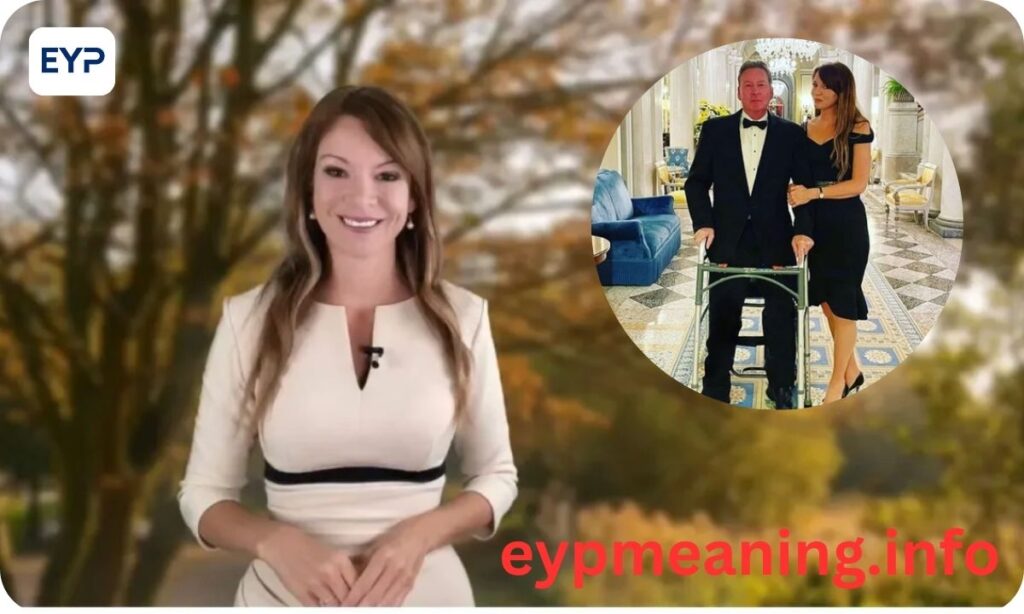Elizabeth Rizzini has become a household name across the UK. She is a trusted BBC Weather presenter known for her professionalism. Yet recent years have seen unusual speculation about her personal life. The phrase “Elizabeth Rizzini disability” has gained significant traction online. This article separates fact from fiction. It explores why such rumours emerge and what they reveal about modern media culture.
Public figures often face invasive curiosity. Health and disability speculation particularly attracts attention. Elizabeth Rizzini’s case is no different. Understanding this phenomenon helps us reflect on privacy rights and media responsibility. Let’s dive deep into the facts surrounding these claims.
Who is Elizabeth Rizzini? A Brief Biography
Elizabeth Rizzini is one of the most recognizable faces on BBC London Weather. Her career spans several years of dedicated broadcasting. She brings weather forecasts to millions of viewers daily. Her calm demeanor and clear communication style have earned widespread trust.
Born and raised in the UK, Rizzini pursued a background in science and communication. This unique combination serves her well in broadcasting. She translates complex meteorological data into accessible information. Viewers appreciate her ability to make weather forecasting relatable and engaging.
Beyond her professional life, Elizabeth is a dedicated mother. She balances career demands with family responsibilities gracefully. This juggling act resonates with many working parents. Despite her public profile, she maintains a relatively private personal life. She rarely engages with tabloid speculation or unnecessary media attention.
Key aspects of her personal brand include:
- Professional integrity in all broadcasts
- Scientific accuracy combined with accessibility
- Family-focused values outside of work
- Privacy maintenance despite public visibility
Elizabeth Rizzini’s Career at BBC Weather
Joining the BBC marked a pivotal moment in Elizabeth Rizzini’s career. She became part of a prestigious team of meteorologists. Her role involves delivering daily weather updates for BBC London. She also appears on national broadcasts when major weather events occur.
Her career highlights demonstrate her expertise and dedication. She has covered extreme weather situations with composure. From severe heatwaves to devastating floods, Rizzini provides crucial information. Her forecasts help people make informed decisions about their daily activities.
Rizzini’s approach to weather presenting stands out. She doesn’t just read forecasts mechanically. Instead, she engages viewers with context and explanation. She often discusses climate change implications in her segments. This educational approach elevates her role beyond simple weather reporting.
Notable career achievements include:
- Regular appearances on BBC News and BBC Breakfast
- Coverage of record-breaking weather events across the UK
- Integration of climate awareness into mainstream weather discussions
- Building a loyal viewer base through consistent, reliable reporting
Her colleagues respect her professionalism. Viewers trust her forecasts implicitly. This combination of peer recognition and public confidence defines her success. She represents the best of public service broadcasting.
The Origins of Elizabeth Rizzini Disability Rumours
The phrase “Elizabeth Rizzini disability” began circulating online mysteriously. No clear source or credible report sparked these rumours. Instead, they emerged from the murky depths of internet speculation. This pattern is increasingly common in the digital age.
Several factors likely contributed to the rumour’s spread. A misinterpreted photograph could have started questions. A careless social media comment might have been taken out of context. Sometimes, the mere absence of information creates space for speculation. When public figures don’t address every aspect of their lives, people fill gaps with guesses.
The clickbait culture of modern media amplified these whispers. Headlines suggesting hidden truths attract more engagement. Content creators sometimes prioritize views over accuracy. This environment allows unfounded rumours to gain momentum quickly. Within weeks, a baseless speculation can become a trending topic.
Understanding how these rumours spread reveals important patterns:
- Lack of verified sources from the beginning
- Rapid social media amplification without fact-checking
- Clickbait headlines that hint at secrets
- Echo chamber effects where speculation reinforces itself
Elizabeth Rizzini is not alone in facing such scrutiny. Many public figures experience similar situations. Health and disability speculation seems particularly prone to viral spread. The fascination with celebrity vulnerability drives much of this behaviour.
Separating Facts from Speculation
Does Elizabeth Rizzini actually have a disability? Based on all verified information, the answer is no. She has never publicly disclosed or confirmed any disability. No credible news source has reported such information. The rumours exist entirely in the realm of speculation.
This distinction between fact and fiction is crucial. In the absence of confirmation, we must avoid making assumptions. Public figures have no obligation to disclose personal health information. Their silence on a topic does not constitute confirmation of rumours.
The persistence of these rumours demonstrates a troubling pattern. When public figures choose privacy, speculation often intensifies. Some interpret silence as suspicious rather than respecting it as a boundary. This mindset creates unnecessary invasions of privacy.
What we know for certain:
- No official statement from Elizabeth Rizzini confirming disability
- No reputable media outlet has published verified reports
- Professional conduct remains consistent and unaffected
- Public appearances show no indication of disclosed disability
Rizzini’s choice not to address rumours aligns with her overall approach. She lets her professional work speak for itself. She focuses on delivering quality weather forecasts. This dignified response deserves respect rather than further speculation.
How Media Handles Disability Topics
The media plays a powerful role in shaping disability perceptions. Unfortunately, coverage often falls into problematic patterns. Disabilities are either sensationalized or treated as inspirational stories exclusively. This binary approach lacks nuance and authenticity.
In the case of Elizabeth Rizzini disability rumours, most reputable outlets showed restraint. They chose not to fuel baseless speculation. This responsible approach reflects growing awareness of ethical journalism. Sensationalizing personal health issues can cause real harm to individuals.
However, the vacuum left by mainstream media gets filled elsewhere. Gossip blogs, forums, and social media platforms thrive on speculation. These spaces prioritize engagement over accuracy. They often lack editorial oversight or fact-checking mechanisms.
Media responsibility in disability coverage includes:
- Avoiding sensationalism around health topics
- Respecting privacy of individuals
- Promoting authentic representation rather than stereotypes
- Fact-checking rigorously before publication
Progressive media organizations increasingly recognize these principles. They understand that disability representation should normalize diversity. Coverage should avoid treating disabilities as secrets, scandals, or exclusively inspirational narratives. Balanced, respectful reporting serves everyone better.
Public Fascination with Celebrity Health
Why do people obsess over whether Elizabeth Rizzini has a disability? The answer lies in our cultural relationship with celebrity culture. We’re drawn to the private lives of public figures. Health topics particularly attract attention because they reveal vulnerability.
Several psychological and social factors drive this curiosity. People seek connection with celebrities by finding similarities. Speculation culture thrives on social media platforms. When information is scarce, humans naturally fill gaps with guesses. This tendency intensifies in the digital age.
The fascination manifests in various ways:
- Social media discussions analyzing public appearances
- Forum threads dedicated to speculation
- Search engine queries seeking confirmation
- Clickbait articles exploiting curiosity
While natural human curiosity is understandable, it often crosses ethical lines. Public figures deserve the same medical privacy as anyone else. Being on television doesn’t revoke fundamental privacy rights. The entertainment we derive from speculation must be balanced against respect for individuals.
This phenomenon particularly affects women in media. Female presenters face more invasive scrutiny than male counterparts. Their appearance, health, and personal lives receive disproportionate attention. Elizabeth Rizzini’s experience fits this broader pattern of gendered media treatment.
Elizabeth Rizzini and Privacy in the Public Eye
Elizabeth Rizzini’s situation perfectly illustrates the tension between public and private life. As a broadcaster, she’s a familiar face in millions of homes. This visibility doesn’t mean every personal detail is public property. Understanding this distinction is essential for respectful public discourse.
By choosing not to engage with speculation, Rizzini reinforces important boundaries. She demonstrates that professional identity can remain separate from personal disclosure. This approach is particularly significant for women in media. They often face more pressure to share personal information than men do.
The principle of privacy in public life deserves strong defense. Public figures serve specific professional roles. Their work should define their public identity. Personal health, family matters, and private choices deserve protection. This boundary benefits both individuals and society.
Respecting privacy means:
- Not demanding explanations for personal choices
- Avoiding speculation about health and disability
- Focusing on professional contributions rather than private matters
- Challenging invasive media culture when it crosses lines
Elizabeth Rizzini’s dignified handling of speculation sets an example. She continues delivering excellent weather forecasts. She maintains professional standards without addressing rumours. This response demonstrates that silence can be powerful and appropriate.
Representation of Disability in Broadcasting
While Rizzini hasn’t confirmed any disability, the conversation opens important discussions. How does broadcasting represent people with disabilities? Historically, television underrepresented this community significantly. Progress has been slow but gradually improving.
For decades, disability representation was minimal or stereotypical. When people with disabilities appeared, they were often tokens or inspirational figures. Authentic, complex portrayals were rare. This lack of representation perpetuated harmful stereotypes and exclusion.
Recent years have brought encouraging changes. More broadcasters hire presenters with visible and invisible disabilities. Inclusive casting becomes increasingly common across programming. Open discussions about disability normalize differences rather than treating them as unusual.
Progress in disability representation includes:
- More diverse presenters across news and entertainment
- Authentic storytelling that avoids stereotypes
- Accessibility improvements in broadcasting technology
- Normalized conversations about disability experiences
If speculation about Rizzini highlights anything, it’s our lingering discomfort with disability. The fact that such rumours generate interest suggests we still treat disability as unusual. A truly inclusive media landscape would make disability unremarkable rather than gossip-worthy.
Why Inclusivity in Media Matters
Media inclusivity benefits everyone, not just marginalized groups. Diverse voices create richer content and broader perspectives. Representation shapes how society understands and accepts difference. This power carries significant responsibility for media organizations.
Inclusivity specifically regarding disability representation serves multiple purposes. People with disabilities see themselves reflected in media. Non-disabled audiences develop greater understanding and empathy. Stereotypes get challenged through authentic portrayals. The entire media landscape becomes more truthful to actual human diversity.
The benefits of inclusive media include:
- Breaking down harmful stereotypes about disability
- Providing role models for people with disabilities
- Educating audiences about diverse experiences
- Normalizing differences rather than treating them as exceptional
- Reflecting true societal diversity in broadcasting
The lesson from Elizabeth Rizzini disability speculation extends beyond her individual case. It highlights why we must move beyond treating disability as gossip material. Instead, media should integrate disability naturally into programming. Presenters with disabilities should be unremarkable rather than sensational.
Creating truly inclusive media requires conscious effort. Broadcasters must actively seek diverse talent. They must tell authentic stories without exploitation. They must make accessibility a priority rather than an afterthought. These commitments transform media for the better.
Social Media’s Role in Spreading Rumours
Social media platforms have revolutionized information sharing. Unfortunately, they’ve also become rumour mills. The Elizabeth Rizzini disability speculation demonstrates how quickly unfounded claims spread online. Understanding this mechanism is crucial for media literacy.
Platforms like Twitter, Facebook, and Reddit operate on engagement metrics. Controversial or sensational content gets amplified automatically. A single speculative comment can reach thousands within hours. Unlike traditional media, these platforms lack robust fact-checking mechanisms.
The anatomy of social media rumour-spreading includes:
- Initial speculation posted without evidence
- Algorithmic amplification based on engagement
- Echo chamber effects where communities reinforce beliefs
- Lack of accountability for spreading misinformation
- Speed of spread outpacing fact-checking efforts
For Elizabeth Rizzini, this digital environment turned vague curiosity into widespread rumour. Users shared speculation without verification. Each share added perceived credibility to baseless claims. The collective effect created a false sense that “something must be true.”
Combating this requires critical thinking from users. We must question sources before sharing. We should demand evidence for claims about public figures. We must recognize our role in either spreading or stopping misinformation. Individual responsibility matters in the digital age.
Lessons from the Elizabeth Rizzini Disability Speculation
The Elizabeth Rizzini case offers valuable lessons about modern media culture. These insights extend beyond her individual situation. They apply to all public figures facing health-related speculation. They also guide how we consume and share information.
First, public curiosity must be balanced with respect. Interest in public figures is natural and harmless in moderation. However, invasive speculation about health crosses ethical lines. We must recognize where legitimate interest ends and violation begins.
Second, silence does not equal confirmation. When public figures don’t address rumours, we shouldn’t interpret it as validation. People have every right to keep personal matters private. Demanding explanations or disclosures is inappropriate.
Third, media platforms carry responsibility. Traditional journalism generally showed restraint in this case. However, social media and gossip sites filled the gap. We need better mechanisms for accountability in digital spaces.
Key takeaways include:
- Respect privacy even for public figures
- Demand evidence before believing or sharing claims
- Question motives behind speculative content
- Recognize gendered patterns in media scrutiny
- Promote inclusive discourse about disability
Finally, the speculation paradoxically creates opportunity. Discussions about disability awareness can emerge from these situations. Rather than fuel gossip, we can redirect conversations toward meaningful topics. We can challenge why disability still generates such curiosity.
The Broader Impact on Disability Awareness
Ironically, the unfounded Elizabeth Rizzini disability rumours may serve a purpose. They reveal persistent social discomfort with disability. They show how health topics become gossip rather than normal conversation. This awareness can catalyze positive change.
The speculation highlights several societal issues. We still treat disability as something unusual or secret-worthy. We lack comfort discussing disability openly and normally. We perpetuate stigma through how we talk about these topics. Recognizing these patterns is the first step toward improvement.
The conversation can shift in productive directions:
- Normalizing disability in public discourse
- Challenging stigma that makes health seem scandalous
- Promoting authentic representation in media
- Educating about disability rights and privacy
- Building more inclusive communities online and offline
Every rumour cycle presents this choice. We can either perpetuate harmful patterns or learn from them. We can either gossip or have meaningful conversations. The Elizabeth Rizzini situation offers that opportunity now.
Moving forward requires collective effort. Media organizations must prioritize responsible reporting. Social media users must practice critical thinking. Public figures deserve support when facing speculation. Together, we can create a culture that respects privacy while promoting inclusion.
FAQ,s
Who is Elizabeth Rizzini?
Elizabeth Rizzini is a BBC London Weather presenter known for professional, accessible forecasts and scientific expertise in meteorology.
Does Elizabeth Rizzini have a disability?
No verified information confirms Elizabeth Rizzini has any disability. All speculation lacks credible sources or evidence.
Why are there rumours about Elizabeth Rizzini Disability?
Rumours stem from internet speculation amplified by social media, lacking any factual basis or credible reporting.
How does media speculation affect public figures?
Speculation invades privacy, spreads misinformation, creates emotional distress, and distracts from professional accomplishments.
What can we learn from the Elizabeth Rizzini disability discussion?
We must respect privacy, promote disability inclusion, practice critical thinking online, and challenge gossip culture.
Conclusion
The story of Elizabeth Rizzini disability speculation reveals more about our culture than about Rizzini herself. No credible evidence supports the rumours that have circulated online. What exists instead is a case study in modern media behaviour, privacy violations, and our ongoing discomfort with disability topics.
Elizabeth Rizzini has responded to speculation with dignified silence. She continues excelling in her role as a trusted weather presenter. Her professionalism and commitment to privacy deserve respect and admiration. She demonstrates that public figures need not surrender all personal boundaries.






